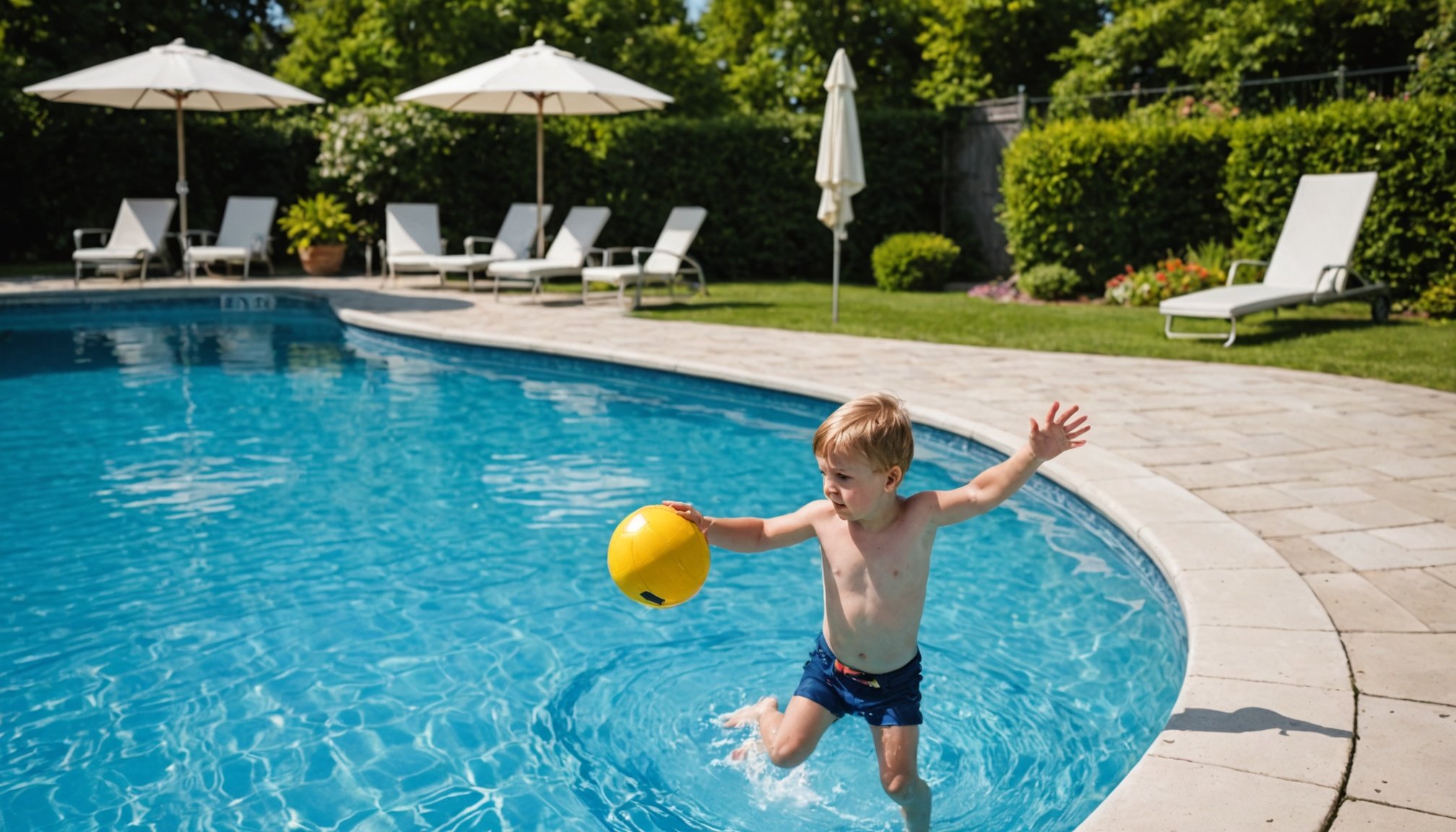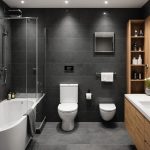Essential Criteria for Selecting Pool Alarms
When selecting pool alarms, it’s crucial to understand the role of key pool safety features in ensuring property protection. An essential feature to consider is the alarm’s sound sensitivity and range. A high sensitivity level ensures the alarm detects even the slightest disturbances, while a wide range guarantees the alert can be heard across larger areas.
Equally important are visual alerts and notifications. These serve as a secondary measure of safety, ensuring that even if the audible alarm goes unnoticed, visual signals like flashing lights alert anyone nearby. Evaluating these features aids in creating a comprehensive pool safety strategy.
A voir aussi : Enhancing Your UK Home Pool: The Benefits of Aquatic Plants for Superior Water Quality
Another vital factor is the alarm’s response time. In emergency situations, every second counts. A quicker response time increases the effectiveness of emergency interventions, minimizing risks. Thus, understanding how swiftly an alarm can react after detecting movement or disturbances is key to preventing accidents.
When reviewing options, look for alarms that excel in these areas to enhance property protection and ensure a safer environment. By focusing on sound sensitivity, visual cues, and rapid response, homeowners can confidently select a pool alarm that provides robust pool safety features.
A voir aussi : Maximize Your UK Home Pool”s Water Retention: Harnessing Wind Barriers to Combat Evaporation
Understanding UK Pool Alarm Regulations
In the UK, pool safety standards are crucial to ensure that swimming areas are secure, especially where children are present. Adhering to UK safety regulations means ensuring your pool alarm meets specific legislation set forth by local authorities. These requirements dictate the types of alarms necessary for different pool environments, whether residential or public.
When purchasing a pool alarm, look out for compliance with key safety standards such as BS EN 14604 and EN 50131. These standards ensure high-quality performance and reliability. A compliant alarm should be water-resistant, have a loud audible alert, and preferably be tamper-proof.
Failure to comply with pool safety standards can lead to serious consequences, including legal actions or fines. More gravely, a lack of proper alarms increases the risk of accidents, which the regulations aim to mitigate. Therefore, installing a suitable pool alarm is not just about adhering to the law but safeguarding lives.
Understanding and implementing these UK safety regulations is essential for any pool owner, as it ensures both legal adherence and enhanced safety for all users.
Types of Pool Alarms and Their Comparisons
Choosing the right pool alarm requires understanding the different types of pool alarms available and how they compare. Each type operates distinctively with its pros and cons.
Floating Pool Alarms
Floating pool alarms are designed to detect disturbances on the water’s surface. When a child or an object falls into the pool, the alarm senses the water movement and triggers. Pros include easy installation and portability, perfect for temporary setups. However, they can be prone to false alarms due to wind or debris.
Gate Alarms
Gate alarms offer a proactive approach by securing entry points. Installed on pool gates, these alarms alert you if an unauthorized entry occurs. Their advantage lies in preventing access to the pool, making them ideal for enhancing overall safety. However, they require proper setup to ensure reliability and depend on the pool area’s layout.
Infrared Sensors
Infrared sensors create an invisible beam that, when crossed, triggers the alarm. These are suitable for covering large areas and provide a non-intrusive solution. Cons might include sensitivity to environmental conditions like rain or wildlife, which can cause false alerts. They are best used in homes where maintaining aesthetic appeal is crucial while ensuring safety.
User Reviews and Experiences
Gathering user feedback is crucial when selecting the ideal pool alarm to suit your needs. Online pool alarm reviews provide valuable insights into their real-world performance. Let’s explore what users in the UK are commonly saying.
Numerous reviewers highlight the importance of reliability and ease of use. Alarms that consistently detect disturbances and alert homeowners earn high praise. Brands renowned for this dependability often top consumer lists. On the other hand, complicated installations or frequent false alerts are cited as significant user frustrations.
Common concerns involve battery life and durability. Users prefer alarms with long-lasting power supplies and those that can withstand harsh weather conditions. Performance under various conditions is a key factor determining overall satisfaction.
For those seeking highly recommended options, user experiences point toward specific brands excelling in both reliability and customer service. In the UK, these brands often include:
- Ease of Installation: Simplifies setup without professional assistance.
- Durability: Withstands environmental stress like rain and wind.
- Consistent Alerts: Minimises false alarms while quickly identifying real threats.
By considering real-life experiences shared in pool alarm reviews, you can make an informed decision and ensure safety around your pool.
Reliable Brands and Recommendations
Choosing trusted brands is crucial when investing in pool alarms. Several top manufacturers in the UK are recognised for their innovation and quality. When selecting a brand, consider factors such as brand reliability, product reviews, and warranties. Brands like Pagoda and Poolexa are known for their exceptional standards and trusted brand status in the pool alarm market.
Leading Pool Alarm Manufacturers
-
Pagoda: Known for its user-friendly systems and robust safety features. Pagoda offers various models catering to different pool sizes and requirements. Their alarms are designed to be weather-resistant and provide excellent coverage area, assuring longevity and reliability.
-
Poolexa: Famous for its cutting-edge technology, Poolexa delivers high precision systems that are easy to install and maintain. Their models are versatile, often featuring apps for remote monitoring, enhancing convenience for pool owners.
Consider each recommended brand’s models and how they might fit your unique needs, be it coverage breadth, technological add-ons, or ease of installation. It’s also wise to understand customer reviews and warranty policies, which helps gauge a brand’s trustworthiness and commitment to quality.
Practical Advice for Ensuring Child Safety Around Pools
When ensuring child safety around pools, a combination of proactive pool safety measures is paramount. Implementing general safety practices serves as a crucial foundation. For example, keeping pools fenced with locked gates can significantly reduce the risk of unsupervised access. Such barriers are often seen as a first line of defense and an essential part of family-friendly advice for pool owners.
However, no safety measure is complete without vigilant supervision. Supervision and education play vital roles in maintaining pool safety. It’s important to never leave children unattended near water, and to educate them about the dangers associated with pools. This involves teaching children to understand and respect safety rules, and ensuring they are aware of the depth and potential hazards.
In addition to these strategies, incorporating additional safety devices can offer extra protection. Devices like pool covers or nets help prevent accidents, while life jackets for young or inexperienced swimmers offer crucial support. Combining these physical barriers with pool alarms and other technology enhances safety layers. These options can provide peace of mind while ensuring your pool remains a fun and safe environment for your family.
Installation and Maintenance Considerations
When it comes to pool alarm installation, simplicity and user-friendliness are key factors to consider. Generally, pool alarms are easy to set up. First, select a strategic location around your pool where the alarm can effectively detect when an object or person enters the water. Most alarms come with detailed instructions to guide you through the installation process. Ensure that the device is securely attached, as loose installations can compromise effectiveness.
Regular maintenance is crucial to ensure the pool alarm operates reliably. Begin with a periodic battery check to prevent the power running out unnoticed. If your alarm has a sensor, routinely inspect and clean it, removing debris or mineral buildup that might affect performance. These simple maintenance tips can extend the lifespan and reliability of your pool alarm.
Finally, knowing how to troubleshoot common issues with pool alarms can save time and frustration. For example, if the alarm is not sounding during tests, verify the battery connection and ensure that settings are configured correctly. Addressing these minor issues promptly ensures the safety measures remain steadfast and dependable.










